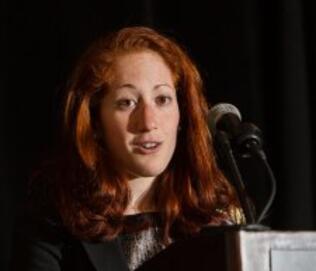
Creative Writing Award - 2014
Class of 2015
About Rebecca Theise
Rebecca Theise ’15 graduated from Brown University with a bachelor’s in community health in 2010. Before starting the GEPN program at YSN, she coordinated health care for recently arrived refugees in New Haven as an AmeriCorps member. She is one of the co-founders of the YSN Narrative Nursing group and will graduate as a pediatric nurse practitioner.
Another Adult Who Doesn’t Get It
“Hey Fag!,” a boy yelled from the hallway. I was hanging up my coat and flattening the wrinkles in my blouse—first day as a nurse practitioner student at the school-based health center. I peeked out the door to look for the perpetrator, reminding myself that I was twice their age and hoping I’d have the courage to use my adult voice. (“Excuse me, young man! What did you just say?”) Maybe I would lasso him with my stethoscope and drag him to the principal’s office. As I scanned the hallway, I couldn’t distinguish the bully from the bullied amid the masses of students in squeaking sneakers, running late to class.
Little kids, little problems, big kids, big problems. These middle schoolers straddle the lines of childhood and adulthood. Most have modest complaints: parents or teachers or siblings are annoying, too much homework, too little sleep. Others have charts indistinguishable from adult patients: high-risk sexual behavior, epilepsy, migraines, asthma. Worse yet, these problems become fodder for lunchroom harassment. When I write “strabismus,” or lazy eye, I might as well add “(and has been teased about it since kindergarten)”. The obese girl’s classmates never miss an opportunity to remind her of her weight as she waits in line for her second slice of pepperoni pizza.
How is school? Fine. Are you sure? Yeah.
These kids are bad liars. Their bodies betray them as I listen to their hearts, peer into their eyes, shine a light inside them. I scribble down plans like ‘Methylphenidate 30mg’, ‘drink less soda’, ‘scrub with Benzoyl peroxide twice a day’. If only I had a pill to make them realize they are not alone in striving to be normal. Make that two pills: The second would cause an extended-release epiphany that there’s no such thing as ‘normal’ and it’s not worth the anguish.
The veteran nurse practitioner I work with likes to know her students’ secrets. There’s always a reason why a thirteen-year-old is in the office asking for a pregnancy test during social studies. Her mother’s affair tore the family apart; her father threatens to move back to the Dominican Republic; her brother no longer speaks to the family; she is caught in the middle. She is now failing eighth grade for the second time and having sex with a boyfriend who doesn’t like condoms. While waiting the five agonizing minutes for the results of her pregnancy and STD test, she declared she would never have sex again. My preceptor has a plastic golden stick topped with a bejeweled star; she calls it her “born-again-virgin fairy princess wand.” Whenever a student receives a negative pregnancy test, she taps her shoulder with the wand and declares her virginity restored. Poof! — mistake erased, lesson learned. Maybe.
As I’ve re-entered this world of middle-school misery, of changing bodies and teen angst, I can’t help but wonder how my patients see me. When I stand up in front of the eighth grade health class to lecture on STDs, pointing at the obligatory pictures of genital warts and cervical discharge, I’m just another adult who doesn’t get it. A girl raises her hand in front of the packed auditorium, and asks, “How many of us do you actually think are having sex and need to know this?” I want to tell her that I’ve already had two girls pee on a stick that week.
I warn kids and parents about all the awful, preventable diseases and the dangers lurking within reach. It’s called anticipatory guidance. For toddlers, it’s the popcorn kernels waiting to be choked on, the bleach under the sink, the lead paint. Once they hit adolescence, the risks are more insidious: cigarettes, unprotected sex, driving while high. To the average teen, those risks are as threatening as a popcorn kernel: They’ll only happen to the kids dumb enough to choke.
I can’t inoculate my patients against everything, least of all the pain of growing up and being responsible for one’s own choices. Just because those eighth grade girls now know what chlamydia is doesn’t mean they’ll be empowered enough to demand that their partners wear condoms. Demonstrating how much sugar is in a can of soda won’t make the vending machine any less appealing. And putting a “This is a Safe Space” rainbow sticker on the door of the health center doesn’t stop anyone from yelling “Hey Fag!” in the hallway.
